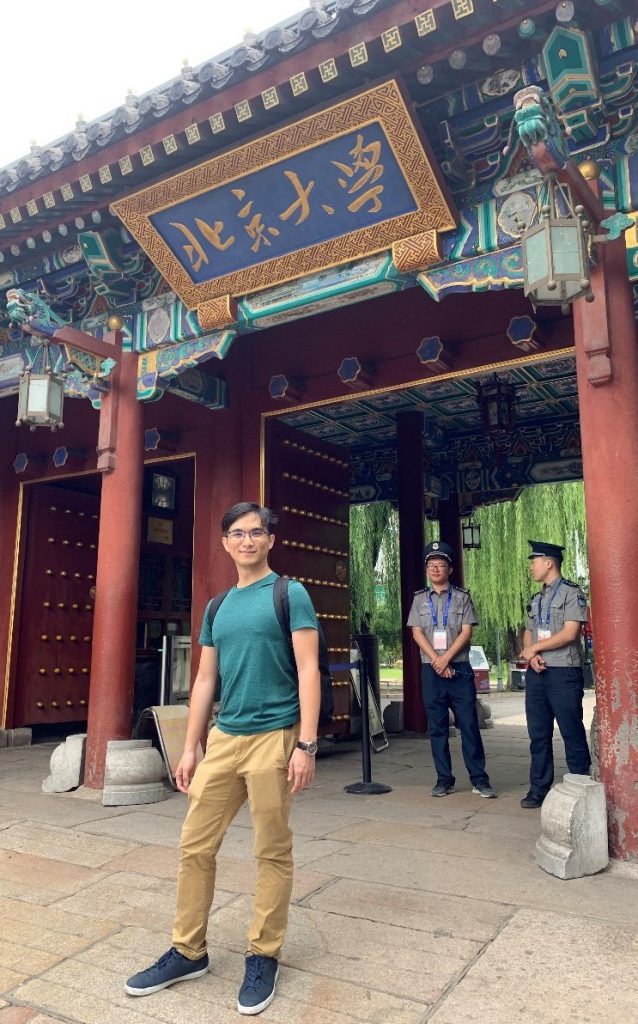September 27, 2019, by Lisa Chin
My research attachment in China – Part I
This post is contributed by Wong Zheng Wei, recipient of the International Research Collaboration Award (IRCA) 2019 and PhD student from the School of Pharmacy.
Beijing, the modern political, cultural and educational capital of China, has become a popular destination for people from around the world. As this was my first time in Beijing (in China, to be exact), I was so looking forward to this experience, with a plethora of emotions, from being ecstatic to borderline worrisome. As a visiting student/researcher, I was motivated to pick up on the work ethics from such a reputable research team and work efficiently on the proposed project in this short period of time which is to prepare functional magnetic nanoparticles (and of course, build my network). On top of that, as a first-timer in China, I wanted to experience the authentic Chinese culture, and the beauty of the nation from its landmark.
It has been two weeks since I have been here, and I can safely say that Beijing has surpassed the stereotypical image that I have prior to this visit. Speaking of which, this region is rich with the Chinese culture, from the authentic Chinese food that I cannot find in Malaysia to the remarkable historical landmarks around the city. The streets are also relatively clean and safe, which wasn’t much of a surprise considering its political stature. However, the issue with communication posed as the main obstacle of my visit, thereby limiting my contact with the locals.
Peking University (PKU) is one of China’s equivalent of Ivy League universities. At first glance, I was fascinated by the grandeur of the entire campus; lush greenery, classical tone, vintage architecture, etc. At the Department of Material Science and Engineering, I was met with the hospitable research team of Prof Hou Yanglong, and given a tour around the lab and nearby research buildings. In short, the entire centre boasts multiple technological advanced analytical equipment and facilities, that are not found in Notts. The availability of these enabled a more comprehensive research output from the team, which was just amazing. During my time here, I will be closely associated with a postdoctoral researcher, whose work coincides with the application of magnetic nanoparticles and its biomedical application.
This came as a surprise to me, but the research team works for 12 hours a day for every single day, despite the flexible work culture. Furthermore, weekly group meetings with Prof Hou are held every Wednesday night for three hours (given the tremendous size of the group), and is the only time where the entire research group would assemble and provide a research update. The entire team comprised over twenty people; Masters and PhD students, as well as several postdoctoral researchers. Throughout the meeting, I couldn’t help but get overwhelmed by the research output of each individual, and the wide scope of research; synthesis of new materials, energy conservation, drug delivery, biomedical applications of nanomaterials, etc. In its entirety, I am just taken aback by the calibre of such an elite research group in an ever-competitive nation.
In these two weeks, I have spent most of the time in the lab to understand the culture and familiarise with the surroundings, and this enabled me to pick up on the lab practice and technical skills commonly employed. The project proposal to prepare magnetic nanoparticles is split into three sections; preparation, functionalisation, and application. With adequate time and guidance, I was able make significant progress in the preparation of magnetic nanoparticles.
That said, this visit wouldn’t have been possible without the support of the UNM IRCA. I am looking forward to bring you updates on my research attachment in two weeks’ time!
About the award
The International Research Collaboration Award (IRCA) is a competitive award to a funded visit, of up to two months duration, with a maximum of MYR 15,000, at a host organisation anywhere in the world that may act as a collaborator for a research project. The host organisation can be any type of organisation (i.e. a university, a research institute, a business, a government department, a charity, a non-governmental organisation).
This year, we offered two doctoral training awards to promote research mobility by enabling the award recipients to undertake a research visit to a leading international research institution of their choice.
About the award recipient
Wong Zheng Wei was announced as one of the winners of the IRCA by Professor Deborah Hall, Vice-Provost of Research and Knowledge Exchange, on 15 July 2019.
Contact us
For any queries or more information, please email us at graduateschool@nottingham.edu.my.
-
Post a comment


